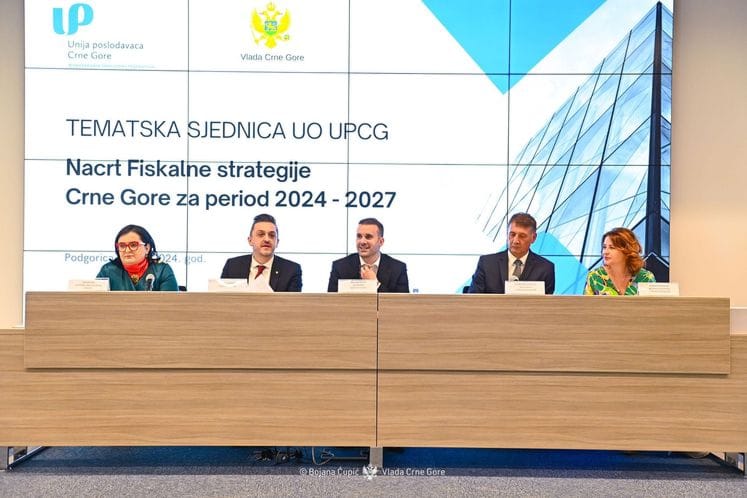- Government of Montenegro
Continued dialogue on Fiscal Strategy
Continued dialogue on Fiscal Strategy

The draft Fiscal Strategy serves as a roadmap for the first major economic reform, prioritizing fiscal stability, the position of employees, and the interests of businesses. All constructive proposals and suggestions will be carefully considered when finalizing the document, as concluded after the latest round of discussions between the Government and business representatives.
Prime Minister Milojko Spajić, Minister of Finance Novica Vuković, and Minister of Labour, Employment, and Social Dialogue Minister Naida Nišić held separate meetings with representatives from the Montenegrin Employers Federation and the Chamber of Economy of Montenegro to discuss the draft Fiscal Strategy for the period 2024–2027.
During a meeting with the expanded Management Board of the Montenegrin Employers Federation, attended by over 80 representatives from various companies, it was emphasised that the new Fiscal Strategy is essential and will provide additional impetus for attracting new investors.
Since 2021, we have lacked a Fiscal Strategy, which has affected our predictability and reliability. As a state, we have not been a sufficiently good partner to the economy. Business decisions are made over the medium and long term, which is why the Fiscal Strategy is an extremely important document. Investors need to understand what will happen in the country over the next three years; this strategy provides them with a basic scenario for that period, stated Prime Minister Spajić.
Members of the Montenegrin Employers Federation contributed to improving the document based on their extensive experience, offering numerous initiatives to enhance the business environment and remove business barriers.
As an entrepreneur who has been running a private company for 32 years, I can assert that this is the first serious economic reform that prioritizes the position of employees, the interests of entrepreneurs, and respects social dialogue in legislative decision-making. It focuses not on immediate interests and election promises but on the developmental impacts this reform will have in the coming period, said Slobodan Mikavica, President of the Montenegrin Employers Federation.
Special attention was given to the proposed introduction of a middle VAT rate and its impact on hotel operations and the hospitality sector in general.
A thorough analysis was conducted to ensure that this rate does not undermine the competitiveness of the tourism industry. I want to emphasise that the total tax burdens that employers pay to the state through taxes and various fees remain lower compared to neighboring countries, explained Branko Krvavac, Chief of the Office of the Prime Minister.

At the meeting at the Chamber of Economy, which was also attended by around 80 businesspeople, President Nina Drakić stressed the importance of maintaining dialogue between the business community and the Government whenever necessary.
According to her statement, businesspeople have submitted comments highlighting several issues that could impact the business environment and operations.
Generally speaking, creating policies aimed at reducing labour costs is positive, but it is important to find the right balance when it comes to increasing the minimum wage, Drakić said.
Businesspeople also called for further consideration of the proposed excise on still wines, given the implications of this measure on the production sector.
The Prime Minister stated that a specific solution for small wineries is available and assured that all comments and suggestions will be carefully analyzed to develop the best final version of the Fiscal Strategy.
Finance Minister Novica Vuković emphasised that the discussions with businesspeople were very constructive and yielded many valuable proposals.
That is the essence of the public discussion, which lasts until 7 August. What we can already confirm is that some of the suggestions will be accepted. We listen to the feedback, analyze the comments, and aim to reach optimal solutions in a document we have been waiting for years, Vuković said.
Meetings with business representatives also highlighted the importance of stronger control to reduce the shadow economy and unfair competition. It was assessed that such measures would positively impact state revenues and also incentivize businesses with tax discipline to invest further and create jobs.


